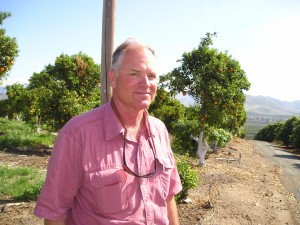
At the July 29th Tulare County Board of Supervisors meeting, Supervisors Phil Cox, Pete Vander Poel and Mike Ennis heard arguments both for and against reversing the planning commission vote to deny the proposed 162-home Elderwood Heights development just west of the City of Woodlake.
However, with Supervisors Allen Ishida and Steve Worthley not in attendance, the decision was postponed until a 7:30pm meeting on August 12th in the Council Chambers at the Tulare Public Library. Ishida and Worthley will have to rely on written transcripts of the range of arguments presented on July 29th.
Aaron Bock, chief planner for the Tulare County Resource Management Agency (RMA), started the discussion by explaining the ecological concerns and state regulations that led to the commission’s decision. After Supervisor Cox instructed those in attendance who were interested in speaking to not repeat previous arguments, because those have all been documented, several Woodlake area residents opposed to the project, from a crowd of about 60, addressed the board.
Kevin Russell brought in a mammoth molar that was found at the site and urged supervisors to consider the property’s archaeological and historical value, and not allow it to be developed. “Once the ground is paved over, it cannot be retained,” he said, adding that, “Native American artifacts (such as pictographs and beads) have been found on virtually every hill.”
“Water is the real issue,” said Robert Pearcy, who lives about a quarter-mile from the proposed development. “The lack of water is perhaps the most important thing to think about.” He added that the project will need “an awful lot of water,” and expressed concerns about the potential runoff into the nearby creek. “I don’t think anyone here is against a certain amount of growth,” he said, but described the planned project as in “the wrong place and the wrong time.”
Lauri Segrue-Polly noted how much unsold property there is currently in the City of Woodlake, and suggested that the new development may have a large number of empty houses.
“This is an agricultural property and should stay that way for years to come,” argued Peggy Hunt, suggesting that the RMA should consider rezoning it that way. “The area is very rural.”
Sandy Maskal read a statement focusing on the site’s flora and fauna, on behalf of a biologist familiar with the area.
“There should be a thorough biological study of the area before the project can move forward. The property developer should pay to conduct a wetlands delineation survey.”
Craig Breon, the attorney for Citizens Against Elderwood Heights Subdivision, was critical of the California Environmental Quality Act (CEQA) document about the site, calling it “severely flawed” and “internally inconsistent.”
He was also critical of the development’s water usage estimate. “It’s a poorly done CEQA document and you should reject it,” he said, before echoing the call to the RMA to rezone the property as agricultural.
David Roberts of R7 Enterprises, the family business that plans to develop the property, talked about his family, which has been in Tulare County since 1976, about the family business and about Elderwood Heights.
“It would give 162 families the opportunity to live the kind of life we all like near Woodlake,” he said. The development “would be built in 10 phases so there wouldn’t be a phase started and left lingering. The rest of the property would be farmed.”
Roberts said that every effort was made to work with county staff for the project. “After eight years of complying, we still have not moved forward. We have substantial time and money invested in this project.
“Many of those who spoke live in parcels made possible based on this type of development,” he said, adding, “The property is zoned for residential use and has been since the ’70s. The project is not only a dream of the Roberts family, but would benefit the County of Tulare and the City of Woodlake.”
Roberts family attorney Shani Jenkins disagreed with earlier comments about the quality of the property for ag purposes. “They’re probably limited to five crops that can grow on their property.”
Bill Roberts of Roberts Engineering of Porterville, one of the developers, disputed the earlier water concerns, saying that “an extensive study” showed there was adequate water on the property. “The water level has not dropped significantly in the past 50 years.” He added that development plans included the use of septic tanks that would “recycle the water right on site.”
After the board moved on to other items, project opponent Diane Searcy and developer David Roberts spoke briefly and cordially outside the building. Roberts told Searcy he was open to dialog about Elderwood Heights.
